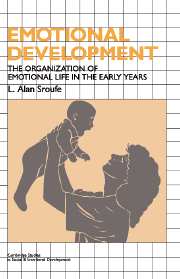Book contents
- Frontmatter
- Contents
- Preface
- Part I The nature of emotional development
- Part II The unfolding of the emotions
- 4 An organizational perspective on the emergence of emotions
- 5 The development of joy: a prototype for the study of emotion
- 6 The development of fear: further illustration of the organizational viewpoint
- 7 The interdependence of affect and cognition
- 8 Meaning, evaluation, and emotion
- Part III Emotional development and individual adaptation
- References
- Index
8 - Meaning, evaluation, and emotion
Published online by Cambridge University Press: 16 September 2009
- Frontmatter
- Contents
- Preface
- Part I The nature of emotional development
- Part II The unfolding of the emotions
- 4 An organizational perspective on the emergence of emotions
- 5 The development of joy: a prototype for the study of emotion
- 6 The development of fear: further illustration of the organizational viewpoint
- 7 The interdependence of affect and cognition
- 8 Meaning, evaluation, and emotion
- Part III Emotional development and individual adaptation
- References
- Index
Summary
[Emotions] arise in response to the meaning structures of given situations, to events that are important to the individual, and which importance he or she appraises in some way.
Frijda (1988)Arousal is a valuable behavioral catalyst and organizer but … heightened and prolonged arousal can be disorganizing … emotional regulation is essential to enlisting emotive processes into the organized and psychologically adaptive higher-order control of behavior.
Thompson (1990)Subjectivity and meaning are critical for understanding all aspects of emotional development (Emde, 1980; Lazarus, 1991). They are central to the very definition of emotional reactions, which have as their core a relationship between the infant and the particular event. They underlie the unfolding of mature emotions from their precursors, because this process is based on the growing meaning of events for the infant. Likewise, they are pivotal for explaining why one emotion rather than another is aroused, especially in what seem to be similar situations. Finally, as will be developed, subjectivity and meaning are essential to conceptualizing individual differences in emotional life.
In this chapter we review the role of subjective factors and meaning in emotion as a transition to examining individual differences in emotional expression and regulation. By the end of the first year it is not events themselves, but what infants make out of them that determines emotional reactions and individual reactivity.
- Type
- Chapter
- Information
- Emotional DevelopmentThe Organization of Emotional Life in the Early Years, pp. 131 - 148Publisher: Cambridge University PressPrint publication year: 1996

